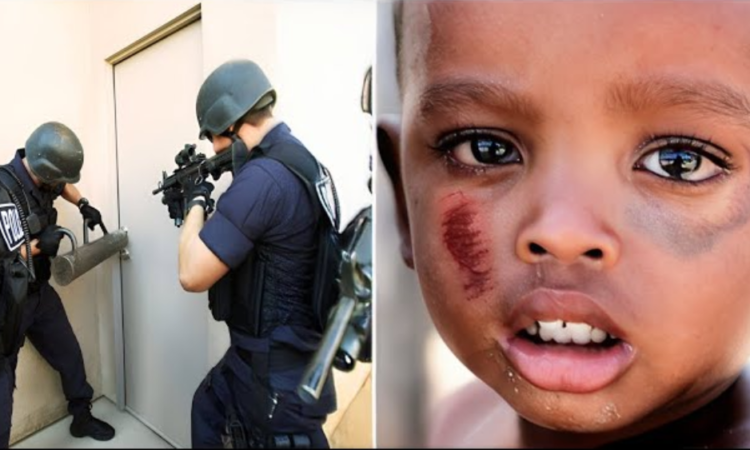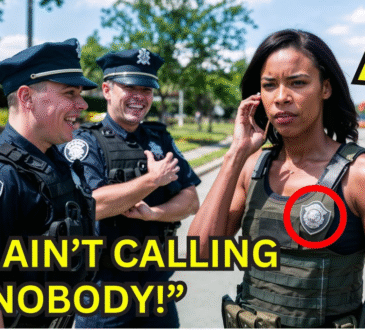4-Year-Old boy Calls 911 And Asks For A happy Meal Cops Faces Turn Pale After Finding This In His Home

Four-year-old boy calls 911 and asks for a Happy Meal. Cops’ faces turned pale after finding this in his home on a quiet Thursday afternoon. The peaceful ambiance of the local police dispatch room was pierced by an unexpected voice through the 911 line.
“Hello, can I get a Happy Meal?” chirped a young innocent voice, revealing no awareness of the emergency number’s significance. Dispatcher Emily, a seasoned professional known for her compassionate nature, paused for a moment, touched by the childlike request interlaced with naivety. She responded warmly, “Hello sweetie, is your mommy or daddy there?”
“No, they’re sleeping. I just want a Happy Meal, I’m hungry,” the child’s voice dwindled into a soft whimper, tugging at Emily’s heartstrings. Sensing that this might be more than a mere childish whim, she considered the possibility of an underlying issue. Children sometimes use innocent calls for help in situations they couldn’t fully articulate.
With a mix of worry and urgency, Emily quickly traced the call’s origin and dispatched Officers Sarah and Mike to the location. She briefed them on the unusual nature of the call, her voice laced with caution. The officers drove to the address, their minds prepared for a scenario of a child possibly left alone.
The scene that greeted them did little to ease their concerns. As they approached the modest home, the sight of the slightly open front door and toys scattered across an unkempt lawn spoke volumes of neglect, perhaps distress. The usually vibrant signs of childhood, these toys now seemed like forlorn relics on the desolate grass.
Stepping out of their patrol car, Officers Sarah and Mike felt a chill run down their spines, the weight of potential discoveries pressing upon them. They crossed the threshold cautiously, announcing their presence in a clear authoritative tone that masked their apprehension.
“The police, anyone here?” Officer Sarah’s voice echoed through the dimly lit hallways of the small, unassuming house, her call met with silence. The air inside was stale, filled with a palpable sense of neglect. As Sarah and her partner, Officer Mike, allowed their eyes to adjust to the gloom, they stepped cautiously into the living room.
The scene that unfolded before them sent an involuntary shiver through their spines. On the couch lay two figures, disturbingly still in the shadowy light. The room was chaotic, with prescription bottles scattered across the coffee table, painting a distressing picture of interrupted lives.
Mike’s throat tightened as he observed the scene. Each bottle was a silent testament to the depth of despair that might have gripped the adults now lying unconscious before them. As Mike moved to check the back rooms, Sarah approached the figures on the couch, her training taking over as she checked for any signs of life.
The pulse was there, weak and thready under her fingers, a small relief amid the overwhelming tension. In a cluttered bedroom amidst a landscape of discarded clothes and old toys, Sarah’s flashlight beam landed on a small makeshift tent of blankets. Underneath, a little boy sat clutching a toy phone, his big eyes filled with fear and confusion.
As she knelt beside him, her heart twisted at the sight of his vulnerability. “Hey there champ, I’m Sarah, we’re here to help,” she spoke gently, reaching out to lift him. He flinched at her touch, a reflex born from fear, but then recognizing a savior, he clung to her, his small arms tight around her neck.
Outside, the flashing light of backup cars painted the night as child services and more officers arrived. The adults were quickly attended to and transported to the hospital, victims of what was suspected to be a substance overdose. The home declared unsafe reflected a tragic narrative that belied the innocent emergency call made by the child.
As the little boy was carried out, the neighborhood once silent now murmured with the activity of care and law enforcement, a stark reminder of the fragile lives within. As word of Jaime’s plight echoed through the community, a ripple of solidarity and support surged through the streets of the small town.
Neighbors, local businesses, and even strangers from adjacent areas rallied, weaving a tight tapestry of care and concern around the young boy whose life had suddenly been thrust into the public eye. Jaime, with his wide-eyed innocence and unwavering spirit, became a beacon of resilience, galvanizing the community towards a heightened awareness and involvement in child welfare issues.
Placed in a nurturing foster home that radiated warmth and safety, Jaime began to thrive. Officer Sarah, who had been instrumental in rescuing him, made it a point to visit regularly. Each visit she brought with her a Happy Meal, a simple joyful reminder of how their bond had formed under such unusual and dramatic circumstances.
Jaime’s face would light up at the sight of the familiar red box, a symbol of a wish fulfilled, a small yet profound pleasure amidst the complexities of his new life. As the weeks melded into months, the community’s embrace helped to mold Jaime’s once uncertain future into a promising tapestry of opportunity and hope.
Inspired by his story, a local initiative took root, aiming to educate parents and children alike on the critical importance of emergency services. Workshops sprang up, flyers circulated, and school programs were initiated, ensuring that every child understood how and when to seek help, transforming their understanding of safety and security.
Jim’s journey from a precarious existence to one brimming with potential underscored the power of collective compassion. It wasn’t just about the material and emotional support he received; it was about the community acknowledging its role and nurturing its youngest and most vulnerable.
A new culture of vigilance began to define the town, changing how neighbors looked out for one another. Ultimately, Jaime’s innocent emergency call did more than safeguard his own life; it sparked a widespread movement. It served as a poignant reminder that the smallest voices often hold the power to affect significant change.
The community learned that when they listened and responded with unity, the echoes of their actions could reach far beyond their own backyards, inspiring widespread change and bringing hope where it was most needed. A lesson in the power of community and the enduring strength of the human spirit.




